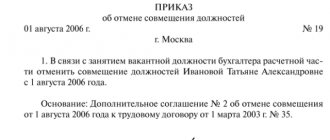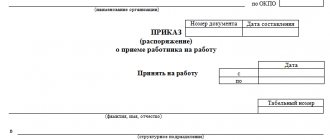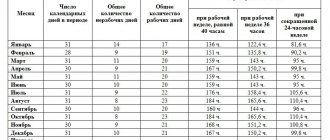Home / Labor Law / Employment / Part-time and part-time work
Back
Published: 07/20/2016
Reading time: 11 min
0
1500
Part-time work is a fairly common type of labor relationship, which involves the employee performing certain job functions during periods free from his main work activity.
A working citizen can become a part-time worker an unlimited number of times if his physical capabilities allow such activity - in this area, workers are not limited by legislative norms.
The main feature of such activity is the presence of a special agreement concluded with one or more employers. At the same time, the employee has a primary occupation that is officially registered. A part-time worker works at an additional place of work exclusively in his free time.
- Legislation
- Registration procedure
- Operating mode
- Similarities and differences
Who is an external part-time worker?
An employee of one enterprise can, after the end of his working day (or before it begins, as well as on his day off), do some other work regularly, with official registration and for wages. In this case, he will be considered a part-time worker and will need to sign an employment contract.
An employee who works in two places at one enterprise in this way is called an internal part-time worker.
An external part-time worker is an employee who thus works at two different enterprises, and an external part-time job is work that he performs in his free time from his main job at another enterprise.
Full time
Sometimes such work is allowed. Alternatively, during a period when he is completely or partially free from official functions at his main job. In this case, an additional agreement is being developed to the employment contract , which will show for how long and why a person is allowed to work part-time full time. The basis for the agreement will be the document from the main work.
For example, we can take the situation with a school teacher. Everyone knows that teachers have long vacations. Someone M. decided to work during his summer vacation. Based on a certificate from the school confirming that this specialist is free and on annual leave during the specified period of time), M. got a job under a fixed-term part-time contract as a tour guide at the museum.
Registration of an external part-time worker
An employee who works part-time must be officially registered at the workplace, that is, with the signing of an employment contract for external part-time work. To do this it is necessary that:
- the employee wrote a job application addressed to the head of the enterprise;
- the enterprise has drawn up an employment contract, which usually does not differ from the standard employment contract adopted by the enterprise;
- the head of the enterprise issued an order to hire an employee on a part-time basis (only after signing an agreement and on its basis).
An entry about external part-time work in the employment record is made only at the request of the employee and is entered at the main place of work. At a part-time job, a personal card is created for an employee and a personnel number is assigned to him.
Contract for external part-time work
As mentioned above, the contract for an external part-time worker is drawn up on the basis of a standard enterprise contract. The document must take into account all the nuances of the labor process: from the conditions of remuneration and rest to the duration of the contract.
The employment contract of an external part-time worker can be indefinite or fixed-term. In the first case, it is valid until the employee decides to terminate it, in the second - strictly until a certain period, after which it can be extended or terminated permanently.
This point is very important, since it is what will be taken into account if the employer for some reason wants to terminate the contract with the part-time worker.
Risks of part-time work
Even despite the emerging opportunities for your realization and receiving additional income, various negative aspects may appear when working in several companies:
- The occurrence of unforeseen situations, for example, illness of a shift worker at a part-time job. When shifts are shifted, the worker will not be able to work in this company due to the coincidence of working hours in both places. In this case, you will have to either arrange time at your own expense or refuse such actions if the circumstances continue for some time.
- It is difficult for an employer to monitor the performance of duties by a part-time worker. Since being in his place, he can completely deal with solving his own problems.
Of course, there are many such cases, but the advantages obtained in the process of cooperation justify all the disadvantages.
Working hours of external part-time worker
Since part-time work is performed in free time from the main job, it is believed that external part-time work should not exceed four hours a day. True, it is allowed to work full time if the main job has a day off or vacation, but it is necessary to strictly take into account the number of hours worked - they should not exceed the time spent on the main job.
If, for example, an employee works one hundred and sixty hours a month at his main job, external part-time work cannot last more than eighty hours a month.
Prohibitions on outside work
Not all categories of able-bodied citizens can be external part-time workers. The ban concerns (Labor Code of the Russian Federation, Art. 329, 282):
- minors;
- workers under hazardous conditions, if the same conditions are assumed to be part-time;
- workers whose work is directly related to driving transport at their main job (they cannot perform similar work part-time).
Civil servants (municipal employees) can work part-time only with the consent of the main employer, provided that there is no conflict of interest in his main job and other work and the time limit is observed - 4 hours a day, 20 hours a week part-time. They do not have the right to combine positions with work in another organization: heads of local administrations, prosecutors, judges, police officers, customs officers, employees of the Central Bank of the Russian Federation. They are allowed only teaching, creative, scientific work (Federal Law No. 79.25, No. 2202-1, 86, etc.).
With whom can you not sign a part-time agreement?
There are restrictions on employing part-time workers. A list of persons who are not permitted to perform this type of activity has been compiled:
- before reaching adulthood;
- people employed in harmful and dangerous areas of work;
- members of the Government in accordance with Federal Law No. 2, Article 11 of December 17, 1997;
- employees of the prosecutor's office under Article 4 of Federal Law No. 2202 - 1;
- employees included in the Board of Directors of the Central Bank of the Russian Federation (Article 86 of Federal Law No. 19);
- employees performing civil service (Article 17 of the Federal Law No. 79 of July 27, 2004);
- restrictions on judges in accordance with Article 3 of Law No. 3132 - 1 of June 26, 1992.
Remuneration of external part-time workers
The payment for external part-time workers is set by the head of the enterprise himself, and he can proceed from such considerations as:
- number of working hours worked;
- manufactured units;
- level of sales of goods or services.
At the request of the employer (with mandatory indication in the employment contract), other wage calculation standards may be applied.
When calculating wages for an external part-time worker, all regional coefficients and allowances that apply to main employees must also be taken into account.
Additional payment up to the minimum wage for external part-time workers
It should also be taken into account that the salary of a part-time worker cannot be lower than the minimum established level, therefore the law provides for additional payments if, according to calculations, the salary does not reach the minimum level.
p>At the same time, if, for example, a part-time worker works by the hour for exactly half of the working week (and, accordingly, the billing period for which wages are calculated), his salary should not be lower than half of the minimum established wage.
Full-time external part-time worker
Can an external part-time worker work full time? When it comes to working hours, the answer is definitely no. In this case, we are dealing with full-time work and such work is already considered the main one, which must be documented.
If we are talking about payment, then this option is possible. At the request of the manager, a part-time worker can receive a full salary (the same as that of the main employees), if, for example, he has higher qualifications. Of course, this should be reflected in the employment contract.
At 0.5 bets
For part-time workers, the “ceiling” is four hours a day and the total working time per month established for those who work full-time in similar positions (Article 284 of the Labor Code of the Russian Federation). When applying for a second (third and so on) job, you can:
- take not the maximum 0.5 rate, but a smaller share, for example, 0.3 or 0.25;
- not work every day or full week.
The main thing is that this is spelled out in the text of the contract on the beginning of the employment relationship.
External sharer operating mode
Above we dealt with the working hours of a part-time worker; in this section we will talk about the working conditions of a part-time worker.
If part-time work involves harmful or difficult conditions, the part-time worker must bring a certificate from his main place of work that he does not perform such work there - otherwise the employer does not have the right to hire him for such work. External part-time work cannot be carried out in harmful conditions if such conditions already exist at the main place of work.
The same applies to vehicle drivers and workers managing traffic flows.
Restrictions on accepting a part-time worker
It is important to understand that not every specialist will be able to combine work at two enterprises. These restrictions are established by Art. 282 of the Labor Code of the Russian Federation and special industry legislation.
According to them, it is prohibited to accept on a part-time basis:
- specialists to perform work related to hazardous production conditions, if they perform the same duties at their main place of work;
- persons under the age of 18;
- employees for the positions of drivers, machinists, pilots, or other persons whose activities will be related to driving vehicles, if they perform the same work at their main place.
The full list is given in Decree of the Government of the Russian Federation dated January 19, 2008 No. 16.
In addition to the above persons, the legislation establishes restrictions on combining work at two enterprises in relation to the following categories of citizens:
- employees of state and municipal authorities;
- members of the Government of the Russian Federation;
- judges;
- heads of educational institutions created by the state;
- employees of structures whose activities are related to security (military personnel, employees of the internal affairs department).
There is also a ban on combinations of jobs for some bank employees, doctors, and pharmacists.
If an enterprise decides to hire a specialist who, according to current legislation, is limited in this area, the company faces administrative liability for this (based on Article 5.27 of the Code of Administrative Offenses of the Russian Federation), the employment contract is declared invalid.
As for the part-time worker, he is not obliged to possess information and provide documents that restrict him from combining and employing any other enterprise. Such issues rest entirely with the receiving organization, as does responsibility for violations of labor laws. Therefore, the first thing that the head of the company where the applicant has applied for employment must do is to request documents from him that will clearly describe the nature of the work performed at the main location.
Vacation of an external part-time worker
Since part-time workers are employees with the same rights and social guarantees as the main employees of the enterprise, they have the right to annual paid leave, which cannot be less than the minimum period established by the state.
The provision of leave to an external part-time worker occurs in accordance with the leave schedule and must strictly coincide with leave at the main place of work. That is, even if a part-time worker has not yet earned his vacation, the head of the enterprise is still obliged to give him these days in advance so as not to violate the Labor Code.
Advantages and disadvantages of external part-time work
The benefits that a specialist who combines work at different enterprises will receive include:
- the opportunity to receive additional income;
- realization of your creative inclinations;
- acquiring new skills, knowledge and experience;
- additional guarantee of financial support in case of dismissal from the main place of work;
- testing your abilities in a new field of activity, if the responsibilities at the new place of work are radically different from the main ones.
The disadvantages include the following:
- The main difficulty lies in combining vacation schedules. In this regard, you have to make a choice in favor of vacation at one of two places of employment;
- constant workload.
Sick leave for external part-time worker
State social guarantees also provide for payment of temporary disability of a part-time worker. True, the Ministry of Health and Social Development recently revised some of its requirements, and now payment of sick leave to an external part-time worker is made both at the main place and at the part-time place only if he has worked for at least two years at both enterprises. To do this, the employee must provide both places of work with an original sick leave certificate, which the hospital must issue in the required quantity.
Application for internal part-time job
When combining within an enterprise, it is necessary to conclude a second employment agreement.
And the necessary documents at the enterprise are already available in the personnel department. In addition, you need to send a request for internal combination. At the same time, you need to pay attention to the fact that part-time work and filling a position are different concepts and the industrial relations here are not the same.
The application form is no different from similar employment letters.
For internal part-time work, no special agreement is needed, but an additional agreement is signed and the basic employment contract is adjusted.
Entry into the work book for part-time work is not carried out, but, at the request of the part-time worker, such an entry can be made (Article 66 of the Labor Code of the Russian Federation).
When working part-time, it is allowed to introduce a probationary period, but when replacing, it is not allowed to establish it.
How to write
To get an internal part-time job, a person needs to submit an application that displays the desired work schedule, work and rest schedule, salary, etc.
In addition, the form must be drawn up correctly in a free style, in compliance with the rules for writing business letters.
According to the Labor Code of the Russian Federation, internal part-time work is the implementation by an employee of additional workload, with the exception of the execution of his main job descriptions, within one institution after the main working day.
According to the Labor Code of the Russian Federation, a citizen has the right to a plurality of additional works, provided that he has time to complete them and each one is completed in accordance with the standards.
The process of assigning additional workload to an employee during internal part-time work includes the following:
- The parties agree on aspects of the relationship the day before.
- The employee registers a request in the name of the boss to enroll him in the recommended vacancy as an internal part-time worker.
- The HR department draws up an employment agreement, as an addition to the main employment contract, and an order for part-time work.
- The parties sign the documents drawn up, and the employee begins to fulfill his obligations.
Sample
What information does the application contain?
As noted above, an application for employment is not required by the standards, therefore it is written in a free style or according to the sample established by the company.
To compile such a form, you can use the rules regulated by Law No. 59-FZ of May 2, 2006 (as amended on November 3, 2015). Guided by law, this form must contain the following information:
- Company name.
- FULL NAME. head of the company.
- FULL NAME. candidate for a vacancy.
- Request for admission to a part-time job, displaying the vacancy and start date.
- Date of application.
- Applicant's signature.
What documents should be attached?
Art. 283 of the Labor Code of the Russian Federation states that a citizen who has expressed a desire to work part-time in a company is required to present the following documents:
- A copy of your ID.
- TIN form.
- Certificate of education and level of professionalism.
- Two photographs.
- Insurance form.
- Work book.
- Military ID.
- Certificate from the company for the main job.
- Documents for children.
- Questionnaire.
If you are working internally, you do not need to provide any materials.
statement on external and internal part-time work
- Application for external part-time work, pdf
- Application for internal part-time work, doc
Average number of external part-time workers
To submit tax and statistical reporting, as well as to calculate insurance premiums, enterprise managers may need to calculate the average number of employees. This indicator is calculated simply: the number of full-time employees is divided by the number of calendar days per month or the number of months in the year (depending on which calculation period is needed).
How, then, are external part-time workers taken into account? They are not taken into account in the calculation of the average number of employees, since they are registered at their main place of work.
Regulation according to the Labor Code of the Russian Federation
The specifics of regulating the employment of part-time workers are enshrined in Chapter 44 of the Labor Code of the Russian Federation, which defines the concept of part-time work, both internal and external, the procedure for registering an employee, working hours, remuneration, guarantees and compensation, as well as the dismissal procedure.
In accordance with the provisions of Art. 282 of the Labor Code of the Russian Federation, part-time work is the same regular work activity as employment at the main place of work.
An employee must have a work schedule established either in his employment contract or in the internal labor regulations on an ongoing basis, and not for performing certain types of work.
According to the norms given in Art. 283 of the Labor Code of the Russian Federation, the package of documents provided by such a person upon employment is subject to requirements identical to the documents that the main employee is required to submit on the basis of Art. 65 Labor Code of the Russian Federation. That is, he must confirm his identity, qualifications and state of health, which will allow him to perform the duties assigned to him at the proper level.
Despite the fact that a part-time worker is a full-time employee, and in accordance with the law, he is entitled to all the guarantees and compensations specified in federal legislation, there are a number of payments that are provided only at the main place of work. In particular, this includes payment for student leave, periods of incapacity for work, and compensation for special working conditions in the Far North.
Average number of external part-time workers
The average number of employees of an enterprise is calculated to confirm the right to the taxation system used, statistical reporting and submission of information on the number, wages and movement of employees.
External part-time workers in this parameter are taken into account according to the time worked as whole units. That is, the employer needs to add up the total number of people and hours and divide it by the hours of a standard workday or standard workweek. If the result is a fractional number, it is rounded.
ipinform.ru
general information
Part-time work is a form of employment that involves a person doing additional tasks in his free time.
It is understood that they are issued to him regularly and are also paid. They can be implemented on weekends or after working hours. Part-time obligations cannot be fulfilled during a break. Distinctive features of the combined activities are:
- the presence of a main employer whose activities take up most of the time;
- executed employment contracts with the main employer and with the head of the company whose activities are carried out as part-time jobs, indicating the requirements for the scope of work or time worked;
- performing combined work during an officially unoccupied time period.
Legal acts regulate the concepts of combination of internal and external nature. In the first case, a person combines all types of activities in one enterprise. Two employment contracts are drawn up with him. The method of relationship is beneficial for both management and the employee. A person increases his level of income and does not need to spend additional time moving between enterprises. The employer entrusts the task to an already proven employee, who finds it easier to perform job duties due to familiarity with the specifics of the enterprise.
Who is an external part-time worker?
In case of a part-time job of an external nature, it is assumed that the person fulfills obligations for two types of work in different organizations. Moreover, he can work in both places in the same specialty or in different ones. Legal acts do not provide for such restrictions.










